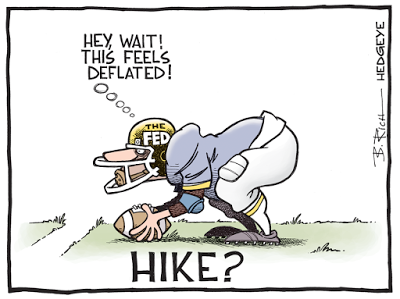Summary:
In the last issue, The Economist suggests that the Fed should not be concerned too much with inflation, and that they should not raise the interest rate for now. They say: "Weak wage growth suggests that there is still lots of slack in the labour market. Underemployment, which includes workers who are part-time but want a full-time job, and discouraged workers who might be tempted back into the labour force, stands at just over 10%, higher than before the crisis. This measure probably has further to fall before wage growth picks up. The Fed may also be underestimating how far unemployment can fall without stoking inflation." Instead of raising it now, Yellen should wait until the December meeting. In their words: "A rate rise would cause a big market reaction, because it is not fully expected. Markets place roughly a one-third probability on it happening. Were Ms Yellen to hold off, she would have time to lay the groundwork for a more predictable rise in December.
Topics:
Matias Vernengo considers the following as important: FED, Interest rates, Yellen
This could be interesting, too:
In the last issue, The Economist suggests that the Fed should not be concerned too much with inflation, and that they should not raise the interest rate for now. They say: "Weak wage growth suggests that there is still lots of slack in the labour market. Underemployment, which includes workers who are part-time but want a full-time job, and discouraged workers who might be tempted back into the labour force, stands at just over 10%, higher than before the crisis. This measure probably has further to fall before wage growth picks up. The Fed may also be underestimating how far unemployment can fall without stoking inflation." Instead of raising it now, Yellen should wait until the December meeting. In their words: "A rate rise would cause a big market reaction, because it is not fully expected. Markets place roughly a one-third probability on it happening. Were Ms Yellen to hold off, she would have time to lay the groundwork for a more predictable rise in December.
Topics:
Matias Vernengo considers the following as important: FED, Interest rates, Yellen
This could be interesting, too:
Merijn T. Knibbe writes Monetary developments in the Euro Area, september 2024. Quiet.
Lars Pålsson Syll writes Central bank independence — a convenient illusion
Merijn T. Knibbe writes How to deal with inflation?
Matias Vernengo writes Brief note on public debt and interest rates in Brazil
 In the last issue, The Economist suggests that the Fed should not be concerned too much with inflation, and that they should not raise the interest rate for now. They say: "Weak wage growth suggests that there is still lots of slack in the labour market. Underemployment, which includes workers who are part-time but want a full-time job, and discouraged workers who might be tempted back into the labour force, stands at just over 10%, higher than before the crisis. This measure probably has further to fall before wage growth picks up. The Fed may also be underestimating how far unemployment can fall without stoking inflation." Instead of raising it now, Yellen should wait until the December meeting. In their words: "A rate rise would cause a big market reaction, because it is not fully expected. Markets place roughly a one-third probability on it happening. Were Ms Yellen to hold off, she would have time to lay the groundwork for a more predictable rise in December."
In the last issue, The Economist suggests that the Fed should not be concerned too much with inflation, and that they should not raise the interest rate for now. They say: "Weak wage growth suggests that there is still lots of slack in the labour market. Underemployment, which includes workers who are part-time but want a full-time job, and discouraged workers who might be tempted back into the labour force, stands at just over 10%, higher than before the crisis. This measure probably has further to fall before wage growth picks up. The Fed may also be underestimating how far unemployment can fall without stoking inflation." Instead of raising it now, Yellen should wait until the December meeting. In their words: "A rate rise would cause a big market reaction, because it is not fully expected. Markets place roughly a one-third probability on it happening. Were Ms Yellen to hold off, she would have time to lay the groundwork for a more predictable rise in December."
